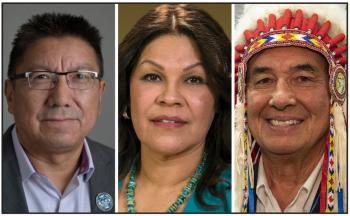Image Caption
Summary
Local Journalism Initiative Reporter
Windspeaker.com
Federal legislation introduced on Thursday that would move Canada closer to the implementation of the United Nations Declaration on the Rights of Indigenous Peoples (UNDRIP) was met with mixed reactions.
David Lametti, the minister of Justice and Attorney General of Canada, and Carolyn Bennett, the minister of Crown-Indigenous Relations, announced the introduction of Bill C-15. The legislation is a move towards ensuring Canadian laws are consistent with the UN rights declaration.
“The legislation is a significant step forward on the shared path to reconciliation for Indigenous and non-Indigenous people alike,” Lametti said of the UNDRIP Act. “It has the potential to be transformational.”
This is not the first attempt to get UNDRIP legislation passed into law. The previous Parliament got close with a private member’s bill initiated by former NDP MP Romeo Saganash.
Lametti said Saganash’s bill was eventually held up in the Senate because of political gamesmanship.
“We made a commitment that we would turn this into a government bill and we made a commitment that we would table it before the end of 2020,” Lametti said. “We have met both of those commitments.”
Lametti said he realizes the government still has plenty of work to do to turn the legislation into federal law.
“We are not done,” he said. “This is a dialogue that continues…”
In recent months, government officials held discussions with various Indigenous groups, including representatives from the Assembly of First Nations (AFN), Inuit Tapiriit Kanatami (ITK) and Métis National Council to form the legislation.
Discussions will continue now because if the bill is passed, the government will create an action plan towards implementation. But federal officials are giving themselves a three-year window to form and implement the plan.
Perry Bellegarde, the national chief of the Assembly of First Nations, said the bill is long overdue, but it’s not perfect.
“There’s one concern I have about the bill. That it gives too long a deadline for creating the action plan,” Bellegarde said. “We’ve waited too long already. We don’t want to wait for another three years.”
While Lametti believes discussions still need to be held, Bellegarde said Indigenous leaders need to continue fighting for the bill.
“We cannot and should not rest until we all hear those words ‘Royal Assent’,” he said.
Lametti said some apprehensions about the bill have already been raised. And he doesn’t understand why.
“I’d rather not speculate on opposition as we feel the bill is a good bill,” he said. “It’s about human rights. How can you be against the recognition and the assertion of inherent human rights? So, we think this bill will have wide support in Parliament and in the Senate.”
Bennett also believes the legislation is meaningful.
“It formally entrenches the rights of Indigenous people in Canadian law,” she said. “We have a responsibility as a country to ensure that Indigenous rights are firm, but that they are also fully understood and respected.”
This legislation responds to the Truth and Reconciliation Commission’s Call to Action 43. This action calls on the government to fully adopt and implement UNDRIP as the framework for reconciliation.
The legislation also responds to the Calls for Justice in the final report of the National Inquiry into Missing and Murdered Indigenous Women and Girls.
ITK president Natan Obed deemed the introduction of Thursday’s bill as a noteworthy point in Canadian history.
“Significant work is now required to ensure that the bill advances through the legislative process and achieves Royal Assent as quickly as possible,” he said, adding he’s hoping all parties move toward this goal with a united front.
David Chartrand, the national spokesperson for the Métis National Council, said he was extremely proud of Thursday’s announcement.
“We will make history today, all of us,” he said. “I’m sure our ancestors are smiling upon us and they share this monumental change as Canadians come together to continue building. Let’s not forget this is a very young country.”
Chief Wilton Littlechild, who served as a commissioner of the Truth and Reconciliation Commission, said the legislation offers opportunity to substantially improve the situation of Indigenous people.
“We are now on a path of true reconciliation, healing, peace and justice” he said. “But we have to do our share. We need to build on the strength of our people, to lift each other up.”
But Nishnawbe Aski Nation Grand Chief Alvin Fiddler issued a statement about his concerns.
“We acknowledge the Government of Canada’s action to begin the process to adopt the UNDRIP with the introduction of this legislation,” he said. “It is important to note that this is not implementation legislation, nor has Canada moved to legally adopt the UNDRIP into federal law.
“Instead, this is a framework to establish an implementation mechanism. We share concerns that the development of this framework will be guided by an action plan that does not yet exist, and that the federal government has given itself a minimum of three years to develop one.”
Marlene Poitras, Regional Chief of Alberta, is also taking a wait-and-see approach.
“I am cautiously optimistic about the new bill,” she said.
Poitras said Indigenous leaders will need to ensure government officials maintain their desire to see this legislation become federal law.
“It will be our work to ensure the government stays true to its commitment to work in partnership with Indigenous peoples and rights-holders in the development of a national action plan,” she said.
“We recognize that significant work (is) needed to advance the bill through the legislative process, however, First Nations need to be a large part of that process to make improvements to the Act.”

